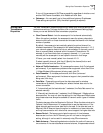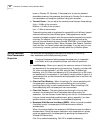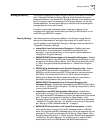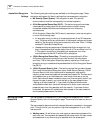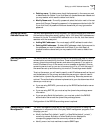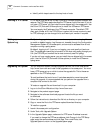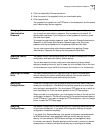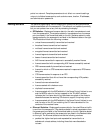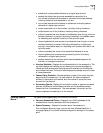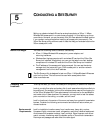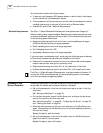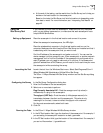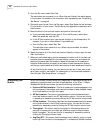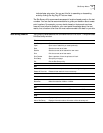
Viewing System Status 35
■ subnetwork unicast packets delivered to a higher-layer protocol
■ packets that higher-level protocols requested be transmitted to a
non-unicast (a subnetwork-broadcast or subnetwork-multicast) address,
including those that were discarded or not sent
■ non-unicast (subnetwork-broadcast or subnetwork-multicast) packets
delivered to a higher-layer protocol
■ octets transmitted out of the interface, including framing characters
■ octets received out of the interface, including framing characters
■ outbound packets that were chosen to be discarded, even though no errors
had been detected, to prevent their being transmitted; one possible reason
for discarding such a packet could be to free up buffer space
■ inbound packets that were chosen to be discarded, even though no errors
had been detected, to prevent their being deliverable to a higher-layer
protocol; one possible reason for discarding such a packet could be to free
up buffer space
■ outbound packets that could not be transmitted because of errors
■ inbound packets that contained errors preventing them from being
deliverable to a higher-layer protocol
■ packets received via the interface which were discarded because of an
unknown or unsupported protocol
■ Interface Statistics—Displays the interface statistics for the access point. The
top table displays the interface counts, showing the cumulative packets or
frames sent and received and the bytes sent and received over the Ethernet
and wireless interfaces. The bottom table displays the rates per second for each
of these parameters.
■ Channel Retry Statistics—Provides statistics for each of the radio channels
supported by the access point. For each channel, the table indicates the
number of frames sent and received, and the number of retries that have
occurred for that channel.
■ Forwarding Counts—Displays the cumulative number of packets forwarded
between the Ethernet and wireless interfaces, and the broadcast packets
transmitted from the access point. The rows represent the source, and the
columns represent the destination of the forward.
Viewing System
Status
The system status pages display the following information:
■ Currently Associated Clients—Displays a list of MAC addresses of the
wireless clients currently associated with the access point.
■ System Summary—Displays information about the access point.
From the System Summary page, you can also view Wireless Details for a
one-page display of the current wireless configuration settings for the access
point.



